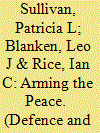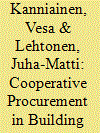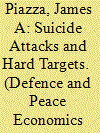|
|
|
Sort Order |
|
|
|
Items / Page
|
|
|
|
|
|
|
| Srl | Item |
| 1 |
ID:
171016


|
|
|
|
|
| Summary/Abstract |
This article analyses the defence industrial market using an agent-based model. The model draws a simplified version of the sector regarding the market agents and their conduct based on empirical data and commonly observed micro-regularities. Its computer implementation is initially tested on a simple scenario to verify its realism. Afterwards, some specific scenarios, caused by government industrial policies, are assessed. The main finding is the capability of the model to reproduce the behaviour of market agents and to replicate the evolution of the macroeconomic indicators and patterns normally seen under different, but common conditions and policies (e.g. free market, discriminatory procurement, licensed production or multilateral development and production). This suggests a powerful tool for gaining further insight and exploring government policies in this important economic sector.
|
|
|
|
|
|
|
|
|
|
|
|
|
|
|
|
| 2 |
ID:
171009


|
|
|
|
|
| Summary/Abstract |
What are the effects of foreign security assistance on the quality of the peace in post-conflict countries? Despite the stakes, and the tremendous amount of weaponry and other forms of foreign military aid flowing to governments of post-conflict countries, the academic literature provides little guidance as to what effects policymakers and practitioners should expect from this type of aid. Military assistance provided to the government of a country emerging from the turmoil of civil war could enable the state to establish a monopoly on the legitimate use of force, leading to a more durable peace and greater human security. However, we contend that significant flows of military aid and weapons from foreign governments may encourage regimes to adopt more repressive approaches to governance. We investigate the impact of security assistance on human rights conditions after 171 internal armed conflicts that ended between 1956 and 2012 using a novel measure of military aid and an instrumented measure of weapons transfers. We find strong evidence that both military aid and arms transfers to post-conflict governments increase state repression.
|
|
|
|
|
|
|
|
|
|
|
|
|
|
|
|
| 3 |
ID:
171010


|
|
|
|
|
| Summary/Abstract |
The economic benefits of cooperative procurement derive from, at minimum, increased bargaining power relative to contractors and from economies of scale in production. There is, however, a puzzle: why is this kind of procurement so rare? This paper introduces a bargaining model with forward-looking expectations about the scale of procurement. It is shown that the price sensitivity of the scale of acquisition is favourable for the buying partnership, as it tends to push down the bargaining price. We propose several explanations for why it is hard to align buyers’ incentives: First, preferences for the properties of the products are country-specific, with divergent implications for national security. Second, countries that place a low value on the product have more bargaining power than those that value it highly, and may require a side payment in order to enter a partnership, while the partner may not have sufficient incentives to make such a payment. Third, the gains from cooperative procurement for the producer may not be sufficient to compensate for conflicting preferences among contractors. Fourth, while the future unpredictability of technologies or the future risks of deteriorating national security might support longer-term cooperative procurement, short-term opportunism tends to prevent long-term commitments.
|
|
|
|
|
|
|
|
|
|
|
|
|
|
|
|
| 4 |
ID:
171006


|
|
|
|
|
| Summary/Abstract |
This study evaluates the relationship between a country’s human capital and its capacity to achieve, over time, effective national security. We show that an increase in the importance that a country attributes to its future, and/or in the effectiveness of its education system, leads to a decline in its current civilian services but to increases in its future human capital, civilian services, national security, and social welfare. Data for the Israeli-Iranian arms race confirm our predictions and show that a predilection for short-term political or personal gains impedes investment in human capital and inhibits future economic growth, national security and social welfare.
|
|
|
|
|
|
|
|
|
|
|
|
|
|
|
|
| 5 |
ID:
171008


|
|
|
|
|
| Summary/Abstract |
After the 9/11 attacks in particular, there has been a controversial discussion in the academic and public arena on whether the United States’ close relationship with Israel has made it a likelier target of transnational terrorism. Indeed, foreign terrorist organizations with various ideological profiles have repeatedly justified attacks against U.S. interests as punishment for the (purported) special relationship between the United States and Israel. We analyze the effect of various measures of U.S. support for Israel (e.g. U.S. military assistance to Israel) on anti-American terrorism for the period 1970–2014. Using both time-series and panel approaches, we do not find that more U.S. support for Israel systematically translates into more anti-American terrorism. Rather, other systemic (e.g. U.S. dominance in the international system) and local conditions (e.g. local state failure) are found to predict the patterns of anti-American terrorism. However, as a qualification to these general findings, we also provide some (preliminary) evidence that for terrorism originating from the Middle East and Northern Africa a favorable U.S. policy stance towards Israel may indeed contribute to more anti-American terrorism.
|
|
|
|
|
|
|
|
|
|
|
|
|
|
|
|
| 6 |
ID:
171007


|
|
|
|
|
| Summary/Abstract |
Suicide terrorist attacks are theorized to provide militants with various strategic advantages. Among these is the ability to successfully strike against well-defended or ‘hard’ targets. Scholars argue that because suicide attacks produce higher levels of damage and do not require an escape route for the perpetrator, they are particularly effective against hard targets. Consequently, militants should be expected to use such attacks more frequently, and successfully, against hard targets. This study empirically tests this contention using incident-level data on between 22,000 and 170,000 terrorist attacks in between 154 and 175 countries for the period 1970–2016. It makes two key findings. First, suicide attacks are both more frequently deployed against hard targets, and are more often successfully executed against hard targets. Second, this finding is not a product of foreign military interventions, as previous literature might suggest. Suicide attacks are found to be more likely to be launched against, with success, both domestic and foreign military targets. This underscores the importance of qualities of the target itself when explaining the strategic decision to use suicide attacks by militant groups.
|
|
|
|
|
|
|
|
|
|
|
|
|
|
|
|
|
|
|
|
|